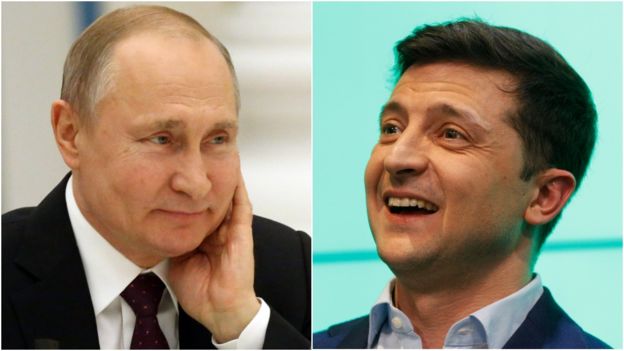
Zelensky’s agenda is no joke and he must find a way fast to impress ‘notoriously fickle’ Ukrainians, analysts say.
Kiev, Ukraine – Ukraine‘s President-elect Volodymyr Zelensky is inheriting a corrupt, war-torn country with the majority of the population pinning unrealistic expectations on the comic-turned-leader, according to a national survey.
In the first 100 days in office, the new president must first lower utility rates, scrap immunity from prosecution for parliamentarians, judges and the presidency, as well as launch or speed up investigations into high-profile corruption cases, the majority of surveyed Ukrainians told the International Sociology Institute of Kiev last week.
None of these demands fall into the president’s scope of power, Oleksandr Danylyuk, Zelensky’s team representative, had to clarify on Monday.
The newly minted politician will have to find a way to impress the population fast though, Peter Zalmayev, a Kiev-based political analyst, told Al Jazeera.
“Zelensky has to hit the ground running as Ukrainians are notoriously fickle in their enthusiasm for new leaders and grow disappointed quickly,” he said.
“He will have to match his performance in this election at the October parliamentary elections in order to form a large enough coalition to govern effectively.”
Second battle
Within weeks following the inauguration, expected in early June – Zelensky will have to jump in election mode again as Ukraine has a parliamentary vote scheduled for October 27.
Without securing a majority in parliament, Zelensky will have no chance of making any changes in the country as his reforms have to be approved by MPs.
According to his victory speech, Zelensky is going to use a highly emotive subject of the 24 Ukrainian sailors captured near the Azov Strait by the Russian military last year to score his first political points.
“Our priority number one now is to return all of our prisoners, all of our hostages, prisoners of war,” he said on Sunday.
Zalmayev said Russia is likely to play into Zelensky’s hands as a “goodwill gesture”, as the Kremlin sees the new leader as “a potentially friendlier face for Moscow”.
“We may certainly expect [Russia’s President Vladimir] Putin to try the Soviet-style tactic of a timed release of hostages, such as the group of 24 Ukrainian sailors,” he said. “But the price he will extract for this goodwill gesture can easily be assumed to be high.”
Zalmayev also said he did not believe Russia would be willing to return the annexed Crimean Peninsula or to disengage from the Donetsk and Luhansk regions of Ukraine that were seized by Moscow-backed separatists in 2014. The conflict has killed more than 13,000 people.
Ihor Kolomoisky
On the internal front, Zelensky will have to struggle to resist the pressure of oligarch Ihor Kolomoisky, who is seen as the force behind his candidacy, Zalmayev said.
“[Kolomoisky] is said to be planning to return from his [self-imposed] exile in Israel,” he said.
Incumbent President Petro Poroshenko has said Kolomoisky intended to take back from the state his now-nationalised PrivatBank, which had been confiscated for alleged financial wrongdoings.
Poroshenko warned that Ukraine will get into even more debt and face a financial crisis if that happened.
Meanwhile, there is also the International Crisis Group’s call on the new president to address the growing movement of “violent, white supremacist, patriarchal ideology” in Ukraine.
It said far-right groups – including National Corps that claims it can mobilise 20,000 activists at any given time – that emerged during the 2013-2014 pro-West uprising that overthrew President Viktor Yanukovich, were threatening the country’s security.
“National Corps is a white supremacist group that talks of ‘reconquering’ European soil and whose members have attacked Roma camps. Its members appear to have ties to American, European and Russian neo-Nazi groups,” an ICG report said.
“[The new president] will need to find a way to remove some of the momentum behind this growing movement lest it further destabilise the country.”
‘Not that bad’
In an interview with Al Jazeera, Vyacheslav Likhachev, director at the National Minorities’ Rights Monitoring Group, confirmed the attacks on the Roma camps, but downplayed the threat of far-right groups.
“The general situation with xenophobia, tolerance and anti-Semitism in Ukraine is not bad right now,” he said.
“A number of guys with the radical-right background, mostly from the Azov regiment, were hired by the interior ministry. But their behaviour has not suggested the need to hyperbolise their ideology.”
Likhachev also said he did not see the armed far-right groups as a threat to Ukraine’s security, since they have been integrated in the country’s military to fight in the east.
On the subject of anti-Semitism in the context of Zelensky’s Jewish heritage, Likhachev said it was unlikely to create a challenging situation for the new leader if his presidency thrives.
“As far as I know, he is the first democratically elected Jewish leader outside of Israel. We don’t expect Zelensky to stress his Jewish origin, and it will probably not come up if he is a successful president,” he said.
“But if he is not successful and the social-economic situation is bad, it is possible anti-Semitic ideas become a little bit stronger in the future not only because of the Jewish ethnic origins of Zelensky himself, but also because of his connection with Ihor Kolomoisky who is also Jewish.”

You must be logged in to post a comment.